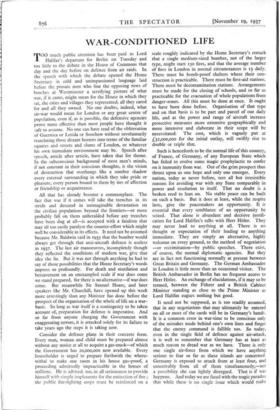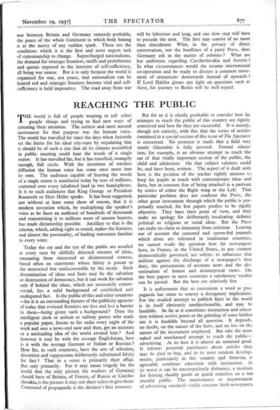WAR- CONDITIONED LIFE
TOO much public attention has been paid to Lord Halifax's departure for Berlin on Tuesday and too little to the debate in the House of Commons that day and the day before on defence from air raids. In the speech with which the debate opened the Home Secretary in cold and unimpassioned language laid before the prosaic men who line the opposing rows of benches at Westminster a terrifying picture of what war, if it came, might mean for the House in which they sat, the cities and villages they represented, all they cared for and all they owned. No one doubts, indeed, what air-war would mean for London or any great centre of population, even if, as is possible, the defensive agencies prove more effective than most people have thought it safe to assume. No one can have read of the obliteration of Guernica or Lerida or Soochow without involuntarily translating those distant horrors into terms of the familiar squares and streets and slums of London, or whatever his own immediate environment may be. Speech after speech, article after article, have taken that for theme. In the subconscious background of most men's minds, if not constant in their conscious thoughts, is the vision of destruction that overhangs like a sombre shadow every external surrounding in which they take pride or pleasure, every person bound to them by ties of affection or friendship or acquaintance.
All that has already become a commonplace. The fact that war if it comes will take the trenches in its stride and descend in unimaginable devastation on the civilian populations beyond the frontiers—or more probably fall on them unheralded before any trenches have been dug at all—is accepted with a fatalism that may all too easily paralyse the counter-effort which might well be considerable in its effects. It need not be assumed because Mr. Baldwin said in 1935 that the bomber would always get through that anti-aircraft defence is useless in 1937. The last air manoeuvres, incompletely though they reflected the conditions of modern war, give that idea the lie. But it was not through anything he had to say of those possibilities that the Home Secretary's words impress so profoundly. For death and mutilation and bereavement on an unexampled scale if war does come we stand prepared, for there is no alternative—if war does come. But meanwhile Sir Samuel Hoare, and later speakers like Mr. Churchill, have opened up this week more arrestingly than any Minister has done before the prospect of the organisation of the whole of life on a war- basis. So long as war itself is a contingency to be taken account of, preparation for defence is imperative. And so far from anyone charging the Government with exaggerating terrors, it is attacked solely for its failure to take years ago the steps it is taking now.
Consider the defence plarks in their concrete form. Every man, woman and child must be prepared aliriost without any notice at all to acquire a gas-mask—of which the Government has 20,000,000 now available. Every householder is urged to prepare forthwith the where- withal to make one room in his house gas-proof, a proceeding admittedly impracticable in the homes of millions. He is advised, too, in all seriousness to provide himself with simple implements for the extinction of fire ; the public fire-fighting corps must be reinforced on a scale roughly indicated by the Home Secretary's remark that a single medium-sized bomber, not of the larger type, might start 15o fires, and that the average number of fires in London in normal circumstances is r5 daily. There must be bomb-proof shelters where their con- struction is practicable. There must be first-aid stations. There must be decontamination stations. Arrangements must be made for the closing of schools, and so far as practicable for the evacuation of whole populations from danger-zones. All this must be done at once. It ought to have been done before. Organisation of that type and on that basis is to be part and parcel of our daily life, and as the power and range of aircraft increase protective measures more extensive geographically and more intensive and elaborate in their scope will be necessitated. The cost, which is vaguely put at £32,000,000 for the initial outlay, will swiftly rise to double or triple that.
Such is henceforth to be the normal life of this country, of France, of Germany, of any European State which has failed to evolve some magic prophylactic to confer on it immunity from war. Out of the grim prospect thus thrust upon us one hope and only one emerges. Every nation, today as never before, sees all but irresistible reasons for avoiding war with any State comparable in power and resolution to itself. That no doubt is a broken reed to lean on. No stable peace can be built on such a basis. But it does at least, while the respite lasts, give the peacemakers an opportunity. It is essential that every semblance of an opportunity be seized. That alone is abundant and decisive justifi- cation for Lord Halifax's talks with Herr Hitler. They may never lead to anything at all. There is no thought or "expectation of their leading to anything immediate. They are simply an alternative, highly welcome on every ground, to the method of negotiation —or recrimination—by public speeches. There exist, of course, the normal diplomatic agencies. But they are in fact not functioning normally at present between Great Britain and Germany. The German Ambassador in London is little more than an occasional visitor. The British Ambassador in Berlin has no frequent access to Herr Hitler. An exchange of elucidations, if it may so be termed, between the Fiihrer and a British Cabinet Minister standing as close to the Prime Minister as Lord Halifax augurs nothing but good.
It need not be supposed, as is too readily assumed, that in any negotiations that may ultimately be entered on all or most of the cards will be in Germany's hands. It is a common error in war-time to be conscious only of the mistakes made behind one's own lines and forget that the enemy command is fallible too. So today, even in the single field of defence against air-attack, it is well to remember that Germany has at least as much reason to dread war as we have. There is only one single air-force from which we have anything serious to fear so far as these islands are concerned. Germany is exposed to attack from at least four, and conceivably from all of them simultaneously,—not a possibility she can lightly disregard. That is if war happens. And today we are faced with the tragic paradox that while there is no single issue which would make war between Britain and Germany remotely probable, the peace of the whole Continent to which both belong is at the mercy of any sudden spark. Those are the conditions which it is the first and most urgent task of statesmanship to change. Supercharged nationalisms, the demand for strategic frontiers, tariffs and prohibitions and quotas imposed in the interests of self-stifficiency, all bring war nearer. But it is only because the world is organised for war, not peace, that nationalism can be heated red and strategic frontiers become vital and self- iufficiency is held imperative. The road away from war will be laborious and long, and one slow step will have to precede the next. The first may consist of no more than elucidation. What, in the privacy of direct conversation, not the headlines of a party Press, does Germany ask in the matter of colonies ? What are her ambitions regarding Czechoslovakia and Austria In what circumstances would she resume international co-operation and be ready to discuss a common move- ment of armaments downwards instead of upwards ? If Lord Halifax gleans any light on questions such as these, his journey to Berlin will be well repaid.

















































































































 Previous page
Previous page